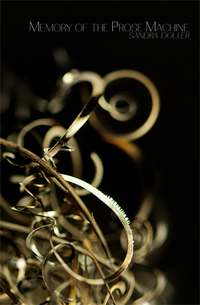Memory of the Prose Machine by Sandra Doller
 Memory of the Prose Machine
Memory of the Prose Machine
by Sandra Doller
CutBank Books, Feb 2013
41 pages / $10 Buy from CutBank
Two days before I arrived home to the package that held Prose Machine, I sat in a restaurant in Moab, Utah, arguing with my girlfriend about poststructuralist theory. The endless bit about relevance. Do we really need to know that much about the gap between words and reality? About the absence of a referent for language? We’re eating hamburgers in a café here. We’re on a road trip in Utah. We’re speaking. We’re talking. Hello.
Emily wondered why the academics didn’t quit if the very form of their own work (language) went against the claims they made. As I saw it, admitting that language doesn’t have a one-to-one correspondence with what we’ve always hoped it does doesn’t make communication impossible; it just complicates it. Maybe even frees it.
Sandra Doller is, like me, one of the hopeful. She understands that a splatter of paint on the canvas is going to look like a penis to me and a popsicle to someone else. But that the important thing, I think, is the communication: there’s someone on the other end.
***
The central conflict of Memory of the Prose Machine, as of more than a couple other rad small press prose-poetry type books I’ve read recently, is meaning. That is, what does it mean when she says, in her opening lines:
Sandra Doller knows, because she’s already been told. She “has no theme,” her words are a bunch of words, that’s all, you can’t follow them because there’s nothing to follow. That’s just how the book is. And it’s not uncommon, I think, to have this kind of indeterminate non-referential Rorschach Test type of approach in cutting edge poetic writing these days. Language without a clear function. Phrases not connected in obvious ways. Words as the field of battle, rather than the images they evoke.
June 3rd, 2013 / 11:00 am
